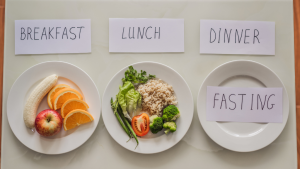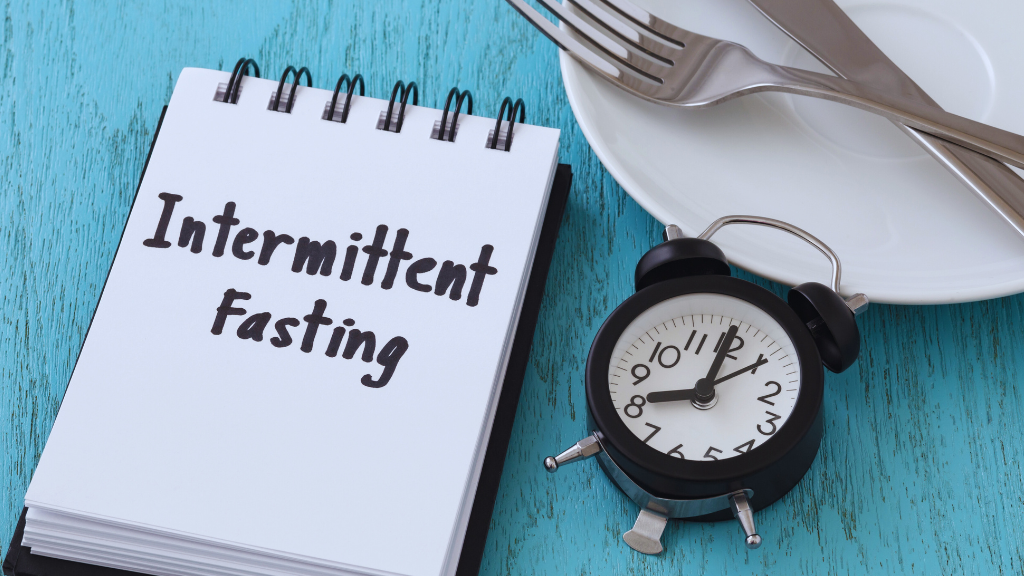Intermittent fasting has become a popular trend in the health and fitness world, with many people claiming it has helped them lose weight, improve their overall health, and even increase their lifespan. But what exactly is intermittent fasting and how does it work? In this article, we will dive into the science behind intermittent fasting and explore its potential benefits.
What is intermittent fasting?
Intermittent fasting is a pattern of eating that involves alternating between periods of fasting and eating. There are several different methods of inter-mittent fasting, but the most common is the 16/8 method, where you fast for 16 hours and have an 8-hour eating window. During the fasting period, you are only allowed to consume water, black coffee, or tea. The remaining 8 hours are used for eating your meals.
How to stick to an intermittent fasting plan.
Sticking to an intermittent fasting plan can require some adjustment and discipline, but here are some tips to help you successfully adhere to your fasting schedule:
- Start Slow: If you’re new to intermittent fasting, it can be helpful to start with a shorter fasting window, such as the 16/8 method, and gradually increase it over time. This allows your body to adapt to the fasting period more easily.
- Set realistic goals: Clearly define your goals for intermittent fasting. Whether it’s weight loss, improved health, or better energy levels, having a clear purpose can help you stay motivated and committed to your fasting plan.
- Stay Hydrated: During the fasting period, it’s important to stay hydrated. Drink plenty of water, unsweetened herbal tea, or black coffee to help curb hunger and keep you feeling satisfied.
- Plan Your Meals: When you break your fast, make sure to have nutritious and well-balanced meals. Include protein, healthy fats, and fiber-rich foods to help keep you feeling full and satisfied throughout the eating window.
- Find Support: Joining a community or finding an accountability partner who is also practicing intermittent fasting can provide support and encouragement. Share your progress, challenges, and tips to stay motivated and committed.
- Distract yourself: During fasting periods, keep yourself busy and distracted to avoid fixating on food. Engage in activities, hobbies, or exercises that you enjoy to shift your focus away from food.
- Listen to your body: Pay attention to your body’s hunger and fullness cues. It’s important to learn the difference between true hunger and emotional or boredom-driven cravings. If you’re genuinely hungry, it may be time to break your fast.
- Be Flexible: Life happens, and there may be occasions when you need to adjust your fasting schedule. Don’t stress over occasional deviations from your fasting plan. Just get back on track as soon as possible.
- Monitor Your Progress: Track your progress, whether it’s through measurements, photos, or journaling. Seeing the positive changes and improvements can be highly motivating and help you stay on track.
- Seek Professional Guidance: If you’re unsure about how to design an intermittent fasting plan that suits your needs or if you have any health concerns, it’s best to consult with a registered dietitian or healthcare professional who can provide personalized guidance.
Remember, consistency is key when it comes to intermittent fasting. By implementing these strategies and staying committed to your plan, you’ll be more likely to stick with it and reap the potential benefits.
How does intermittent fasting work?
Intermittent fasting works by putting your body into a state of ketosis, where it burns fat for energy instead of glucose. When you fast, your body depletes its glycogen stores and starts breaking down fat cells for energy. This process also leads to an increase in human growth hormone (HGH), which can help with muscle growth and fat loss.

There are different types of intermittent fasting.
There are several different methods of inter-mittent fasting. Here are some of the most common types:
- 16/8 Method: This is also known as the Leangains protocol. It involves fasting for 16 hours and having an 8-hour eating window. For example, you might choose to fast from 8 PM to 12 PM the next day and eat your meals between 12 PM and 8 PM.
- 5:2 Diet: With this method, you eat normally for 5 days of the week and restrict your calorie intake to 500–600 calories for the remaining 2 days. The two fasting days should not be consecutive.
- Eat-Stop-Eat: This method involves fasting for 24 hours once or twice a week. For example, you might choose to fast from dinner one day until dinner the next day.
- Alternate-Day Fasting: As the name suggests, this method involves fasting every other day. On fasting days, you typically consume very few calories (around 500) or no solid food at all.
- Warrior Diet: With this method, you fast for 20 hours and have a 4-hour eating window. During the fasting period, you are allowed to consume small amounts of raw fruits and vegetables, as well as protein-rich foods.
It’s important to note that while intermittent fasting can be beneficial for many people, it may not be suitable for everyone. It’s always best to consult with a healthcare professional before starting any new diet or fasting regimen to ensure it is safe and appropriate for your individual needs.
READ THIS –What We Know About Power Book III: Raising Kanan Season 4
Benefits of Intermittent Fasting
Intermittent fasting has been linked to several potential health benefits, including weight loss, improved insulin sensitivity, and an increased lifespan. Studies have shown that intermittent fasting can help reduce body fat and improve metabolic health, making it an effective tool for weight loss. It has also been shown to improve insulin sensitivity, which can help prevent type 2 diabetes.
The best foods to eat while intermittently fasting.
While intermittent fasting doesn’t necessarily dictate specific foods to eat, it’s still important to focus on nutritious and balanced meals during your eating window. Here are some recommendations for the best foods to include in your meals while practicing intermittent fasting:
- Protein-Rich Foods: Including protein in your meals can help promote satiety and preserve lean muscle mass. Good sources of protein include lean meats, poultry, fish, eggs, Greek yogurt, cottage cheese, tofu, and legumes.
- Whole Grains: Opt for whole grains such as brown rice, quinoa, oats, and whole wheat bread. These provide more fiber and nutrients compared to refined grains, helping you feel fuller for longer.
- Fruits and Vegetables: Incorporate a variety of fruits and vegetables into your meals for their essential vitamins, minerals, and fiber. They can also add volume and flavor to your dishes without adding excessive calories.
- Healthy Fats: Include sources of healthy fats like avocados, nuts, seeds, olive oil, and fatty fish (salmon, mackerel, and sardines). These fats help keep you satiated and provide important nutrients like omega-3 fatty acids.
- Dairy or Dairy Alternatives: If you consume dairy, choose low-fat options like skim milk, low-fat yogurt, and reduced-fat cheese. If you prefer dairy alternatives, opt for unsweetened almond milk, coconut milk, or soy milk.
- Fiber-Rich Foods: High-fiber foods can help regulate digestion and promote feelings of fullness. Incorporate foods like beans, lentils, and chickpeas.

The worst foods to eat while intermittent fasting.
While there are no specific “worst” foods to avoid entirely while intermittent fasting, some foods may be more challenging to fit into your eating window or may negatively affect your fasting experience. Here are some foods that you may want to limit or be mindful of during your fasting periods:
- Highly Processed Foods: Foods that are highly processed, such as fast food, chips, sugary snacks, and soda, tend to be high in calories, unhealthy fats, added sugars, and low in nutrients. These can lead to feelings of hunger and may not provide the sustained energy you need during fasting periods.
- Sugary Foods and Beverages: Foods and drinks that are high in added sugars, such as candy, desserts, sweetened beverages, and sugary cereals, can cause blood sugar spikes and crashes. These can disrupt your fasting state and lead to cravings.
- Alcohol: Alcoholic beverages contain calories and may affect your fasting window, especially if consumed during fasting periods. Alcohol can also impair judgment and decision-making, making it more difficult to stick to your fasting plan.
- Fried and Greasy Foods: Foods that are deep-fried or high in unhealthy fats, such as fried chicken, French fries, and greasy burgers, can lead to feelings of heaviness and discomfort during fasting periods.
- Excessive Snacking: Constant grazing or frequent snacking throughout your eating window can make it difficult to maintain a calorie deficit or fully experience the benefits of fasting. Try to have structured meals rather than constant nibbling.
- High-Calorie Beverages: Beverages like sweetened coffee drinks, sugary juices, energy drinks, and high-calorie smoothies can contribute a significant number of calories while providing minimal satiety. Opt for water, unsweetened tea, or black coffee during your fasting period.
Remember, inter-mittent fasting is not about strict food restrictions but rather about when you eat. Prioritize nutrient-dense, whole foods during your eating window to promote overall health and satiety. It’s always best to listen to your body and make choices that align with your health goals and lifestyle.
Intermittent Fasting by Age Chart
inter-mittent fasting can be beneficial for people of all ages, but it is important to adjust the fasting schedule based on your age and health status. The chart above shows a general guideline for erratic fasting by age, but it is always best to consult with a healthcare professional before starting any new diet or fasting regimen.
Intermittent Fasting Calculator
Understanding Intermittent Fasting: Benefits, Methods, and Explained Terms
If you are interested in trying intermittent fasting, you can use an intermittent fasting calculator to determine your fasting and eating windows. This calculator takes into account your age, weight, and activity level to create a personalized fasting schedule for you.
Intermittent fasting has gained popularity due to its potential health benefits, but it also has its pros and cons. Here are some of the main advantages and disadvantages of intermittent fasting:
The pros and cons of intermittent fasting.
Pros of Intermittent Fasting:
- Weight Loss: inter-mittent fasting can be an effective tool for weight loss. Restricting your eating window or calorie intake can help create a calorie deficit and promote fat loss.
- Improved Insulin Sensitivity: Intermittent fasting has been shown to improve insulin sensitivity, which is important for regulating blood sugar levels and reducing the risk of type 2 diabetes.
- Reduced Inflammation: Some studies suggest that intermittent fasting may help reduce inflammation in the body, which is associated with various chronic diseases.
- Increased Human Growth Hormone (HGH): Fasting can stimulate the release of human growth hormone (HGH), which is important for muscle growth, fat loss, and overall health.
- Simplicity and Flexibility: Sporadic fasting can be a simple and flexible approach to nutrition. It does not require specific meal planning or complicated diet rules.
Cons of Intermittent Fasting:
- Hunger and Discomfort: During the fasting period, some individuals may experience feelings of hunger, especially in the beginning. This can make it challenging for some people to adhere to the fasting schedule.
- Potential Nutrient Deficiencies: Restricting your eating window may limit the amount of time you have to consume all the necessary nutrients, leading to potential nutrient deficiencies if not properly planned.
- Disrupted Social Life: Intermittent fasting can affect your social life, especially if your eating window does not align with meal times with friends or family.
- Not Suitable for Everyone: Intermittent fasting may not be suitable for everyone, especially those with certain medical conditions or who are pregnant, breastfeeding, or underweight. It’s important to consult with a healthcare professional before starting any new fasting regimen.
- Possible Negative Relationship with Food: For some individuals, irregular fasting may lead to an unhealthy relationship with food, such as an increased focus on restriction or potential binge-eating behaviors.
As with any diet or lifestyle change, it’s important to consider your individual health needs and goals. It’s always best to consult with a healthcare professional or registered dietitian before starting intermittent fasting or any other dietary plan to ensure it is safe and appropriate for you.

FAQs about intermittent fasting.
Here are some frequently asked questions (FAQs) about intermittent fasting:
- Is intermittent fasting safe? Intermittent fasting is generally safe for most healthy individuals. However, it may not be suitable for everyone, such as individuals with certain medical conditions or those who are pregnant, breastfeeding, or underweight. It’s always best to consult with a healthcare professional before starting any new fasting regimen.
- Will I lose muscle mass while periodic fasting? When done correctly, intermittent fasting should not lead to significant muscle loss. Proper nutrition, including consuming enough protein and engaging in regular resistance exercise, can help preserve muscle mass.
- Can I drink water during fasting periods? Yes, staying hydrated is important during fasting periods. Water, unsweetened herbal tea, and black coffee are generally acceptable to consume during fasting. However, be cautious when adding sweeteners or creamers to your drinks, as they may break your fast.
- Can I take medications and supplements while fasting? It’s generally safe to take prescribed medications and certain supplements while fasting. However, it’s best to consult with your healthcare provider or pharmacist to ensure that taking them during fasting won’t interfere with their effectiveness or absorption.
- Can I exercise while intermittently fasting? Yes, exercising while intermittent fasting is generally safe and can even enhance fat burning. However, it’s important to listen to your body and adjust your exercise intensity and duration as needed. Some individuals may prefer to exercise during their eating window for better energy levels.
- How long does it take to see results with intermittent fasting? The results of intermittent fasting can vary depending on the individual, their adherence to the fasting schedule, and other factors such as diet and exercise. Some people may start noticing changes within a few weeks, while others may take longer. Consistency and patience are key.
- Can I still enjoy social events while intermittently fasting? Yes, periodic fasting can be flexible to accommodate social events. You can adjust your eating window or make healthier food choices during events to align with your fasting goals. Communication and planning ahead can help ensure that you can still enjoy social occasions while practicing intermittent fasting.
More FAQs
The Science Behind Intermittent Fasting: Benefits, Methods, and More
1. Intermittent fasting
2. Help you lose weight
3. Popular diets
4. Ways to do intermittent fasting
5. Health benefits
6. Intermittent fasting work
7. Intermittent fasting, right
8. Effects of intermittent fasting
9. Effects of intermittent
10. Intermittent fasting can help.
11. Fasting plan
12. Inflammation
13. Benefits of intermittent fasting
14. Fasting methods
15. Intermittent fasting methods
16. Powerful weight loss
17. Popular approaches to intermittent fasting
18. Diabetes
19. Fasting period
20. Fasting may
21. Insulin
22. Intermittent fasting may
23. Try intermittent fasting.
24. Alternate-day fasting
25. Metabolic
26. Heart health
27. Weight management
28. Fasting days
29. Forms of intermittent fasting
30. Intermittent fasting is safe.
31. Alternate days of fasting
32. Eating pattern
33. Starting intermittent fasting
34.16 hours
35. Fasting for weight
36. Type 2 diabetes
37. Different ways to do intermittent
38. Body weight
39. Eating Plan
40. Fasting and eating
41. Fast for 16 hours
42. Types of fasting
43. May work
44. Continuous energy restriction on weight
45. Energy restrictions on weight loss
46. Research shows that intermittent fasting
47. hours each day
48. Two days a week
49. Doctor before starting intermittent fasting
50. Involves eating
51. Fat loss
52. Show that intermittent fasting
53. Intermittent fasting involves
54. The type of fasting could
55. Cause weight loss
56. Improve your health.
57. Health benefits of intermittent fasting
58. Evidence that intermittent fasting
59. Involves fasting
60. Days of the week
61. There is also some evidence that intermittent
62. Mayo Clinic Health System
63. Fasting is about as effective as
64. Type of diet
65. Intermittent fasting can be unpleasant.
66. Continuous energy restriction
67. Fasting every other day
68. Healthy diet
69. Intermittent fasting diet
70. Calories on Fasting
71. Form of fasting
72. Foods during the fasting period
73. Intermittent fasting, right
74. Ways to manage your weight
75. Different intermittent fasting
76. Fasting insulin
77. Short-term fasting
78. Fasting can help you lose
79. Normal weight
80. Idea of Fasting
81. Way of eating
82. Fasting means
83. A typical low-calorie diet for weight
84. Low-calorie diet for weight loss
85. Diabetes or other medical
86. Systematic review and meta-analysis
87. Weight loss approach
88. Finding the best
89. Behind intermittent fasting
90. Diet involves eating
91. Fasted for 16
92. Diet one day.
93. Diet and lifestyle
Remember, these are general answers, and individual experiences and circumstances may vary. It’s always a good idea to consult with a healthcare professional or registered dietitian if you have specific concerns or questions about intermittent fasting.
Conclusion
Intermittent fasting has gained popularity for its potential health benefits, but it is important to remember that it is not a one-size-fits-all approach. It is always best to consult with a healthcare professional before starting any new diet or fasting regimen. With the right approach and guidance, intermittent fasting can be a safe and effective way to improve your overall health and well-being.
Have you tried intermittent fasting? Share your experience in the comments below.



